In the ever-evolving landscape of software development, staying ahead of the curve is essential for success. The recent emergence of GitHub Copilot, an AI-powered code completion tool developed by GitHub and OpenAI, has created a paradigm shift in the way developers work. This groundbreaking technology has not only piqued the interest of developers worldwide. It also demonstrated the immense potential of developer-AI collaboration.
At G-Group.dev, we pride ourselves on adopting cutting-edge technologies to ensure that our clients receive the best possible software solutions. As a leading software agency, we understand the importance of continuously exploring new tools and methodologies. We believe they can enhance our development processes. In this blog post, we will delve into the world of GitHub Copilot. Our objective is to shed light on how this innovative technology is transforming the way our developers work.
It is important to note that we employ GitHub Copilot only on projects where our clients have granted explicit permission. We also use it in our internal projects for our own use cases. This ensures that we maintain transparency with our clients and adhere to ethical guidelines while leveraging the power of AI-assisted coding.
We will discuss the inner workings of GitHub Copilot. You will learn how G-Group.dev utilizes its power to boost productivity and code quality. We will also address concerns and limitations that come with AI-assisted coding. By sharing our experience and insights, we aim to inspire other software agencies and developers to embrace the developer-AI symbiosis. This way, they can unlock new levels of efficiency and innovation. So, buckle up and join us as we embark on this exciting journey into the future of programming.
What is GitHub Copilot and how does it work?
GitHub Copilot is an AI-driven code completion tool. The system harnesses the power of OpenAI’s Codex model to assist developers in writing code more efficiently. It intelligently generates code snippets and suggestions based on the context of the developer’s work and their natural language input. This means that developers can simply describe the functionality they require in plain English, and GitHub Copilot will provide relevant code suggestions to help them achieve their goals.
The tool functions as an extension in popular code editors, such as Visual Studio Code and IntelliJ. It integrates seamlessly into the developer’s existing workflow. Once installed, GitHub Copilot actively monitors the code being written and offers context-aware suggestions in real time. This enables developers to quickly access relevant code snippets and adapt them to their specific use cases.
GitHub Copilot has been trained on an extensive repository of public code. Thanks to that, it understands various programming languages, libraries, and frameworks. This vast knowledge base allows it to offer valuable suggestions even for niche and specialized coding problems. By leveraging AI-driven code generation, developers at G-Group.dev can not only save time. Our teams also improve the overall quality and maintainability of the code they produce. This results in better software solutions for our clients.
GitHub Copilot in action: Real-life use cases
To better illustrate the practical advantages of GitHub Copilot, our PHP Tech Leader Marcin Fortuniak has generously provided several use cases he encountered in both his commercial projects at G-Group.dev and his offside initiatives. These examples showcase the tool’s capabilities and demonstrate how it can help developers in their daily tasks. The following screenshots, courtesy of Marcin, exhibit GitHub Copilot’s features in action within an IDE:
Real-time code completion
Copilot fluidly anticipates a developer’s intentions, providing relevant suggestions as soon as it understands the context. These tips are displayed right at the caret. Thanks to that, the developer’s experience is just as smooth and intuitive as if he’d be writing the code himself. Taking advantage of Copilot’s completions is as simple as hitting the tab key when you see he’s caught up.

Problem prediction
Based on the class or method name, Copilot predicts potential issues that our code might need to address. Knowing both what an Encoder class typically looks like and what Base64 is, it accurately foresees what’s the developer’s intention in creating a class named like that, and suggests it all in one go.
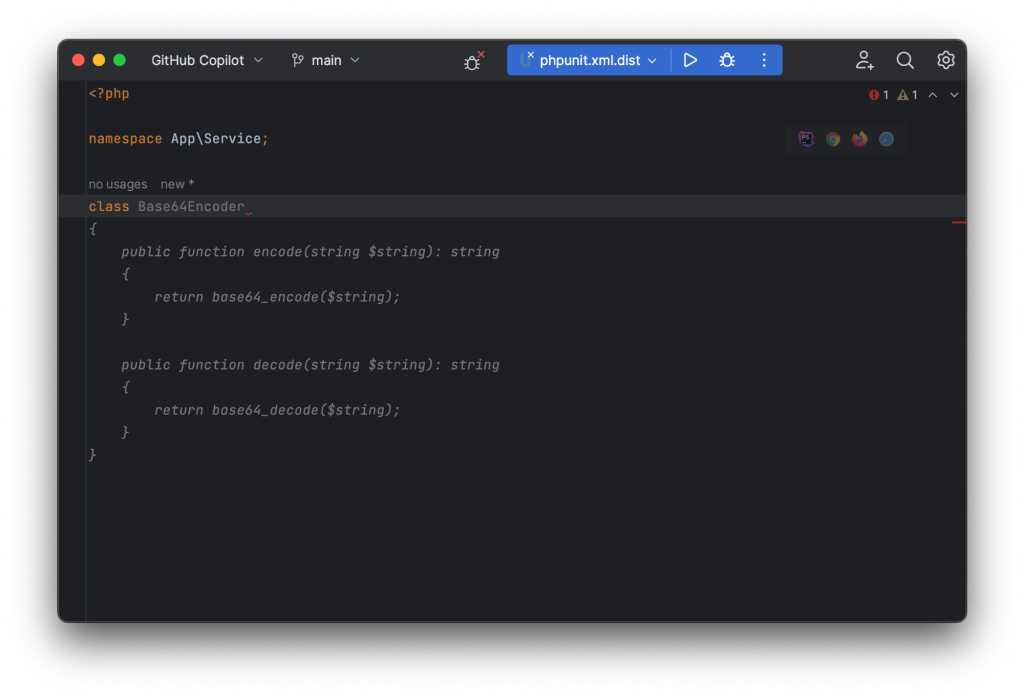
Semantic assistance
Copilot saves developers from pondering over semantics in common coding problems, offering helpful suggestions. Some problems are fairly common but of unusual semantics, but that’s not an issue. Copilot can provide the developer with implementations that are semantically correct, with only the logic to fine-tune.
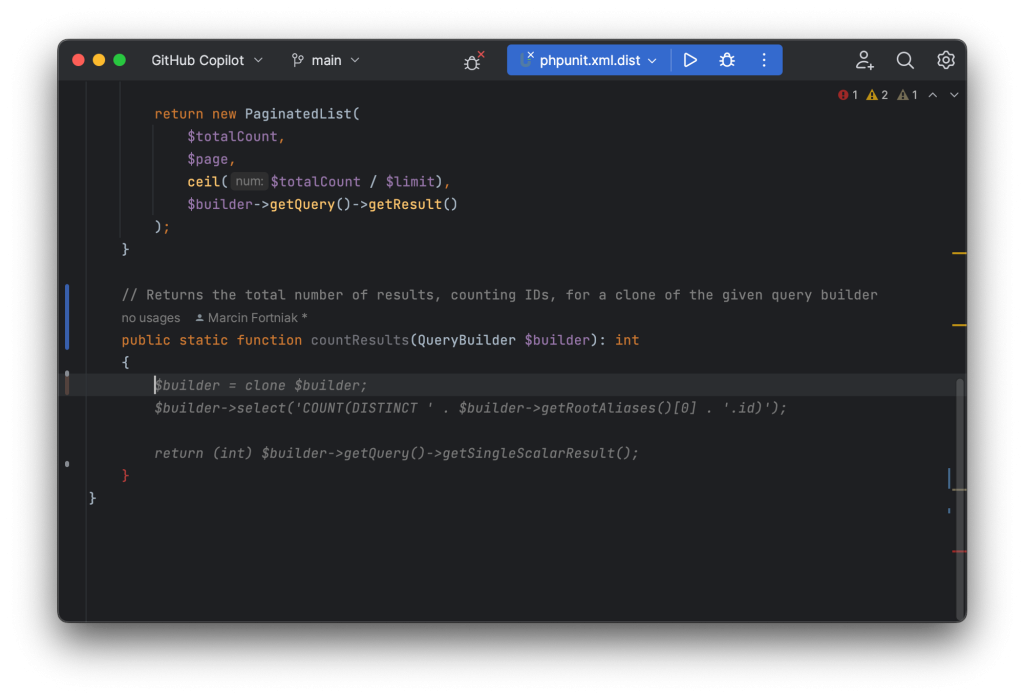
Solving tedious tasks
Copilot tackles challenges that developers would rather avoid, freeing up their time for more critical tasks. It’s great with problems that are either algorithmic in nature or require implementations of package-specific solutions. Both of these tasks require developers to commit a lot of thought to solve. That usually results in disrupted flow and probably ends up with a dive into the documentation. Given that they’re not the first people to turn an image into a thumbnail in Python, Copilot’s got them covered.
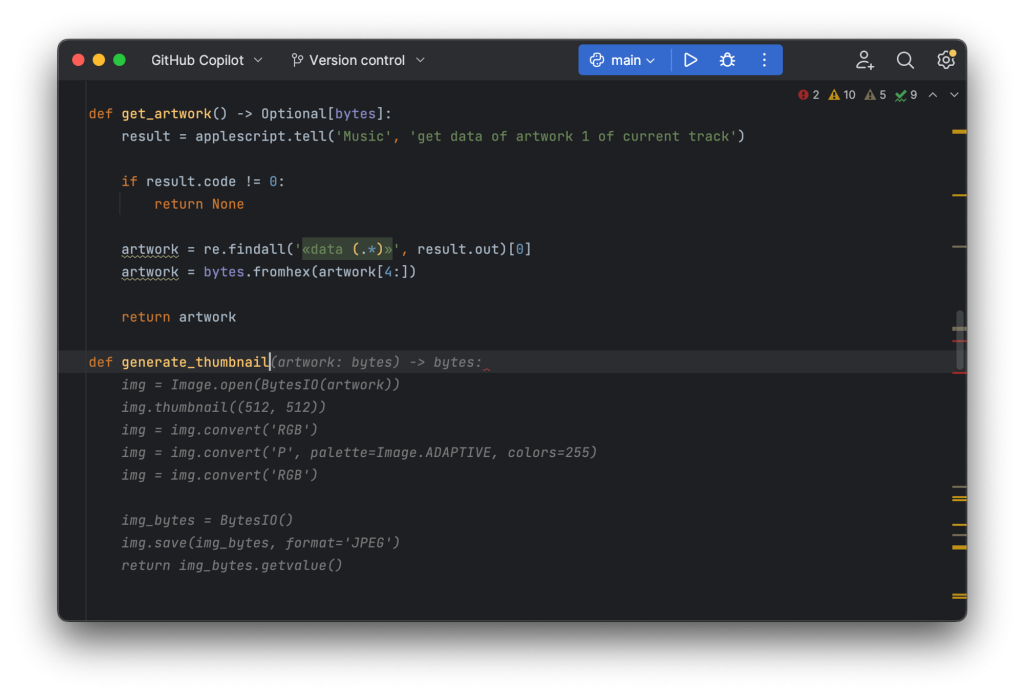
Popular test cases
Copilot is familiar with typical testing scenarios, such as suggesting potential test cases a developer might want to write. This can speed up the process of creating comprehensive test suites. Writing functional tests is a repetitive task. Often the main changes between different endpoints are things like response structure and validation rules. That doesn’t change the fact that these need to be covered thoroughly, and mistakes are more likely to happen. Knowing what cases we’ve covered in other files and understanding the premise of the feature being tested, Copilot can come up with tests that suit our application best.
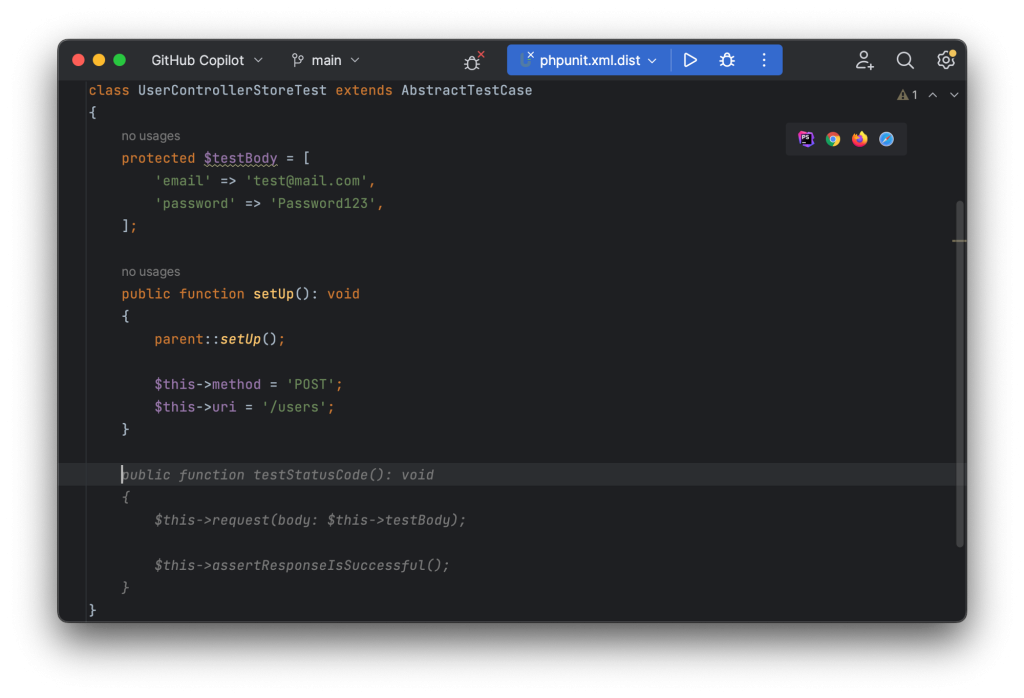
Code simplification
Copilot can attempt to streamline code, making it more efficient and easier to understand. Reading functions with nested loops backed by a few conditional statements, ideally with one-letter variable names, is a lot to unpack. Cognitive complexity, luckily, is not a factor for Copilot. If asked, it can try to come up with code that’s easier to read.
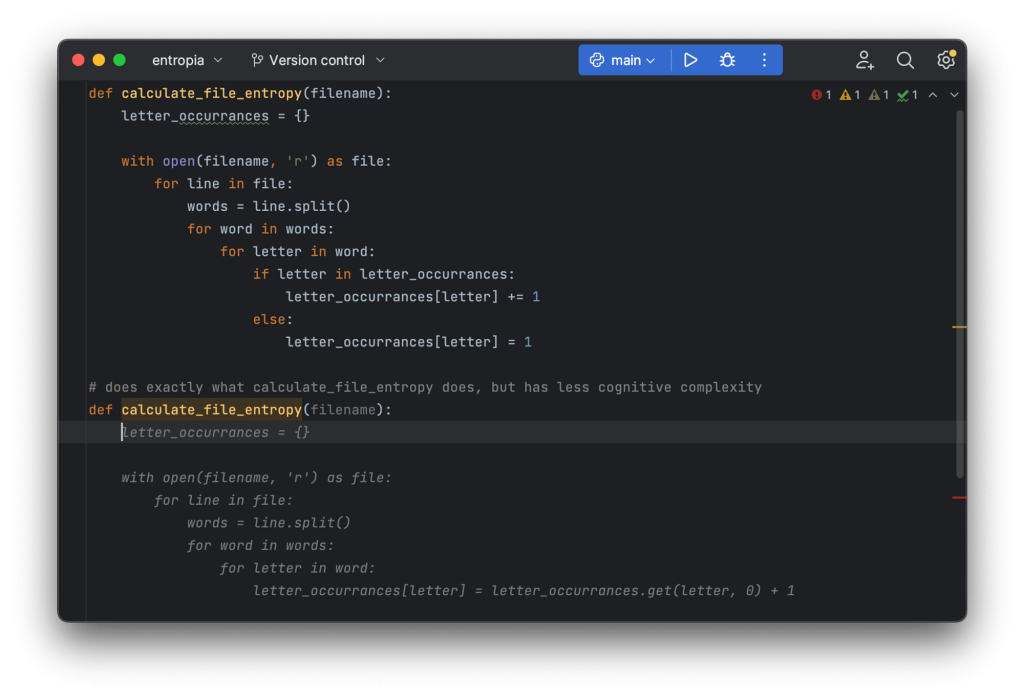
These examples provide a glimpse of how GitHub Copilot can be integrated into a developer’s workflow. They prove that an AI-based approach leads to increased productivity and enhanced code quality for any project.
The strengths and weaknesses of GitHub Copilot
It’s essential to understand the strengths and weaknesses of GitHub Copilot. This awareness allows us to make the most of this AI-driven tool while minimizing any potential drawbacks. Here are some key aspects to consider when using Copilot in your projects:
Strengths:
- Contextual understanding. GitHub Copilot can comprehend the overall context of a project. It takes into account the structure of other classes and suggests code that is consistent with the application’s conventions.
- Handling non-intuitive tasks. Copilot excels at handling tasks that may not be intuitive for humans. Extracting common elements from arrays, grouping items by category, or converting Base64 to BMP and resizing the image are only a few things it can do.
- Anticipating developer needs. Copilot can predict what a developer needs for various functionalities. For example, it can generate functional tests covering most test scenarios that a developer would want to address.
Weaknesses:
- Prone to errors. Copilot-generated code might not always meet the intended requirements or might not work at all. Developers should review the suggestions carefully to ensure code correctness.
- Potential harmful suggestions. Since Copilot generates code based on open-source projects, it may sometimes suggest solutions that could be harmful to users. The most common instances are security vulnerabilities, optimization issues, or improper practices.
- Licensing gray area. The ownership of Copilot-generated code has been a topic of controversy since its inception. It has been known to suggest functions like the fast inverse square root from the Quake 3 source code. This raises questions about copyright and licensing issues.
At G-Group.dev, we acknowledge these strengths and weaknesses. Our developers, like Marcin Fortuniak, take extra care when using GitHub Copilot in both commercial projects and offside initiatives. By being aware of these concerns, we ensure that Copilot serves as a beneficial tool. We use it to enhance our development process while maintaining high standards of code quality and security.
Addressing concerns and overcoming limitations
As with any cutting-edge technology, it is important to address concerns and limitations associated with it. By understanding and overcoming these challenges, we can further enhance the symbiotic relationship between programmers and AI in software development.
Emphasizing developer creativity and problem-solving skills
Although GitHub Copilot is a powerful tool for generating code suggestions and automating certain tasks, it should not be viewed as a replacement for developers. Instead, it serves as a complementary tool that can aid developers in their work. The creativity, critical thinking, and problem-solving skills of software engineers remain essential in the development process. GitHub Copilot can be seen as a helpful assistant that streamlines workflows and allows developers to focus on more complex and challenging tasks.
At G-Group.dev, we continue to emphasize the importance of developer creativity and problem-solving skills. We also ensure that our team members understand the value of their expertise in conjunction with the assistance provided by AI-powered tools.
Ensuring accuracy and addressing bias in AI-generated code
AI-generated code suggestions, like those provided by GitHub Copilot, can sometimes be inaccurate or biased. It is crucial for developers to review the suggestions carefully. They should always apply their own knowledge and expertise to ensure the quality and correctness of the code.
At G-Group.dev, we take measures to address these concerns by promoting a culture of continuous learning and improvement. Our developers are encouraged to stay up-to-date with the latest best practices and advancements in AI and software development. This allows them to better assess the suggestions provided by AI-powered tools like GitHub Copilot. This vigilance ensures that we maintain high standards for code quality and accuracy while benefiting from the increased efficiency and productivity offered by AI-driven solutions.
Conclusion
As a software agency, G-Group.dev recognizes the immense value of embracing developer-AI symbiosis. Thanks to GitHub Copilot and other tools, we can enhance our development process, improve code quality, and ultimately deliver better solutions to our clients. By integrating AI in a responsible and ethical manner, we can augment the skills of our developers and maintain a competitive edge in the ever-evolving tech landscape.
GitHub Copilot has already demonstrated its potential to positively impact our software development process. By assisting our developers in generating code faster, suggesting optimal solutions, and enabling them to focus on higher-level problem-solving, Copilot can help us streamline our workflow and increase overall productivity. By utilizing this tool with a careful and critical approach, we can reap the benefits it offers while mitigating any potential risks.
At G-Group.dev, we encourage our team members and the broader tech community to explore and adopt cutting-edge tools like GitHub Copilot. By staying ahead of the curve and embracing new technologies, we can continuously refine our development processes and deliver innovative solutions to our clients. Being open to experimentation and learning means we can ensure that our developers and our industry as a whole continue to evolve and thrive in an ever-changing technological landscape.
If you’re a developer looking for a new, modern work environment – check out our career page to explore open positions.
Looking for a trustworthy partner to implement an innovative solution for your business? We encourage you to reach out to us. G-Group.dev can outsource developers or prepare the whole software product from scratch. Pick the business model you prefer and find out how we can elevate your brand’s game.